A SON OF THE CHURCH
II. Defender of the Church and the Faith
(1966-1973)
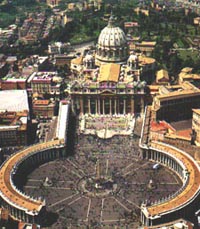
« CÆSAREM appellasti ? Ad Cæsarem ibis. » (Ac 25.12) You have appealed to Caesar; to Caesar you shall go!
When Joseph Cardinal Lefebvre, Archbishop of Bourges, an assessor of the Holy Office and President of the Assembly of Bishops of France, quoted the words of the Roman procurator Festus to St. Paul, he was truly inspired. For, as it turned out, he played the role of Festus, and Fr. de Nantes that of St. Paul. Had not the Apostle warned the Galatians: « But even if we, or an angel from Heaven, should preach to you a gospel contrary to that which we preached to you, let him be accursed! » (Ga 1.8) Now, the gospel that Paul VI announced forty years ago is indeed « contrary » to the one preached to us. (...)
OPPOSITION TO Paul VI
In September 1966, Paul VI granted communion to Barbarina Olson, a Presbyterian, at her Nuptial Mass celebrated at … Assisi! At first, our Father could not believe it: « If it is true, then one must conclude that Rome has lost the faith. »
In November of that same year, on the fourth centenary of the Roman Catechism, the fruit of the Council of Trent, work was begun on a new catechism simultaneously by the Bishops of France, and published in Holland. Fruits of the Second Vatican Council, they were MASDU catechisms. » They replaced the Catholic act of faith with free “ dialogue” between religions, and the Creed with faith in man.
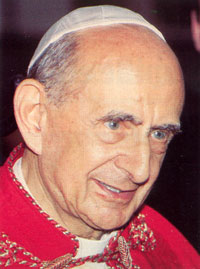
This new faith can be illustrated by a hundred of Paul VI’s speeches, for example, this praise of Communist China and its Red Guards : « We wish to tell the youth of China with what emotion and affection We look upon its present striving towards the ideals of a new life of hard work, prosperity, and harmony. We should like to speak about peace also with those who are today in charge of the life of mainland China. We know to what an extent that human and Christian ideal is shared also by the people of China […] ». After having read this speech, our Father did not hesitate to write:
« What a revelation of feelings! This harmony between Paul VI and Mao, between the innovators in the Church and the Red Guards, the mad dogs ofAsia, shows up and intensifies the discord between civilised people, between Catholics. Why attempt to deny any longer that there exists between this Pope and this Council, this New Church on the one hand and ourselves on the other, a sort of permanent excommunication? » (Letter to my Friends n° 240, of January 6, 1967)
On the following March 7, the Permanent Council of the Bishops of France hastened to publish a warning that was immediately picked up by the press: « He himself states “that there exists between this Pope and this Council, this New Church and ourselves (him and his adepts) a sort of permanent excommunication.” There is therefore no reason to take into account what is affirmed and developed in these letters, and they are not to be passed around. »
But our bishops were very careful not to quote the context, that is, the speech of Paul VI, who addressed Communist China in order to praise the Red Guards. This omission is in itself an admission… (...)
In 1967, which Paul VI had decreed a “ year of the faith”, Fr. de Nantes persisted in accusing the Pope of destroying the Catholic faith. He denounced a « Marxist analysis of the international situation » that is found in the encyclical Populorum progressio, which was promulgated on March 26, Easter Sunday, 1967.
So, the « errors of Russia » announced on July 13, 1917 by Our Lady of Fatima were spreading even in the Church, in the very year of the fiftieth anniversary of the apparitions, under the cover of pontifical teaching!
« Paul VI’s vision fans the flames of this same fire that is consuming our world. Lammenais, with his wild-eyed visions, sits on the Chair of Peter. » (Letter n° 245, p. 10, published in CCR n° 81, December 1976). This is the very precise warning of the Third Secret, which at the time was unknown to our Father, but which the world situation, as it were, placed before his eyes.
FATIMA PROFANED
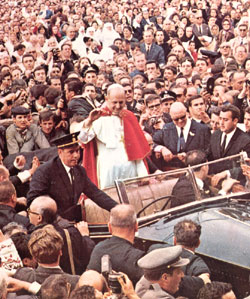
As it happened, 1967, the « year of the faith », was also the fiftieth anniversary of the apparitions of Fatima. On May 13, 1967, the Pope went there, not as a pilgrim, but as an « expert in humanity », refusing to let himself be photographed with Salazar, turning away Sister Lucy who asked to speak to him in private, not even going to the places where the apparitions had taken place! What had he gone there to do? To recite before a million persons what our Father called his « Incantatory litanies to Man:
« Men, it is you We address at this supreme moment; make yourselves worthy of the divine gift of Peace. Men, be men. Men, be good, be wise. » (...)
In this extraordinary homily, Fr. de Nantes observed, the Pope did not ask God or the Blessed Virgin but men for the miracle of peace and cosmic renewal that they await, as though they were a marvellous grace that they would grant to themselves. This grace would come not through “ Prayer and Penance ”, but through a new revelation, in virtue of which Heaven had encouraged the Pope to appeal not only to Catholics but to all men, in order to foster peace.
So, on the very evening of his return to Rome, Paul VI declared:
« At Fatima we questioned the Madonna about the paths to be followed that lead to peace, and we received the answer that peace was a realisable end. » (...)
A few days later, war broke out in the Middle East...
Fr. de Nantes wrote: « The day after this May 13, when Paul VI thought that he had received from Heaven the assurance that “ peace was an achievable goal”, it ceased to be so. » Since then, the Middle East has not ceased to be a powder keg, according to the forecasts that our Father announced:
« Israel will now bear its easy victory like a heavy millstone. (...) but it will not hesitate, as aggressor or attacked, to drag the world into its war. » (...)
Nothing, however, seemed able to heal Paul VI of an incurable blindness.
CARDINAL OTTAVIANI'S RESIGNATION
On January 1, 1968, Pope Paul VI established “ World Peace Day ”, in lieu of the traditional feast of Christ’s Circumcision, (...) by proclaiming this message: « Peace is possible because men are essentially good… » Our Father read this in the newspaper La Croix on January 3. On January 5, 1968, he telegraphed his indignation to Cardinal Ottaviani, the Prefect of the Holy Office:
« Distressed at text, speech attributed to Holy Father. [...] – Astonished by practical negation Devil, original sin, redemption, need of faith and grace to save human order, – terrified by naturalism, temporal messianism and religious indifference attributed to Supreme Magisterium, – scandalised by silence about persecuting Communism aggression, dirty trick played on free world, and worsening conditions of defence of Christendom, South Vietnam, – beg Your Eminence deny or intervene for honour of Holy Church and infallibility of Apostolic See. »

What do you think happened? Forty-eight hours later, we learned that Cardinal Ottaviani had resigned. (...) You might say: it is a coincidence. You are quite mistaken: Cardinal Ottaviani knew Fr. de Nantes perfectly well and listened to him. It was on his advice that Cardinal Ottaviani had Fr. Congar’s book: “ True and False Reform in the Church” withdrawn from sale.
Therefore, when Ottaviani read our Father’s telegram, he must have recognised that he was right. However, instead of intervening with the Pope, he handed in his resignation: « It is obviously a way out... », our Father wrote in the Catholic Counter-Reformation in the XXth Century, the monthly periodical which followed the Letters to my Friends starting in October 1967. « But henceforth this leaves a free field for the enemy. And the Roman Church is in danger of falling into ruins if she abandons the faithful care of her Catholic faith. » (CRC n° 4, January 1968, p. 12)
Once again, the very words of the Secret of Our Lady of Fatima, whose contents Pope Paul VI knew but Fr. de Nantes did not, came out in the writings of the latter, in a spontaneous way, as was demanded by the situation. Paying no heed to Our Lady’s warnings, the Pope was bringing about the « ruin » of the Church, and with her and through her the ruin of the world. (...)
We can understand why Ottaviani resigned. It is not given to everyone to be able to remonstrate with the Pope. Our Father had this courage. On April 24, 1968, he was summoned to Rome to answer for his accusations of heresy against the Council and the Pope. He stayed there for twelve days, explaining his reasons before the tribunal of the Holy Office. (...)
At the end of the preliminary investigation of his trial, (...) the judges and plaintiff agreedthat the record written by the Italian ecclesiastical clerk of the court was inadmissible. What should be done? Who, in three days, could write a precise, accurate, exhaustive and, most of all, impartial report concerning these long hours of subtle theological debate? The judges, quite embarrassed, entrusted this task... to the plaintiff.
« I thus wrote the record of my own trial. [...] On the appointed day, the judges read, approved and countersigned [...]. I believe that this fact is unique in the annals of Holy Office! »
Back home, he did not tell us anything since he had promised to keep the secret until the tribunal returned its verdict. He only commanded us to confirm an order for seven tons of paper. So we understood that the Catholic Counter-Reformation, which at that time had a circulation of twenty thousand, would continue.
THE PRELIMINARY INVESTIGATION AT THE HOLY OFFICE
On June 30, 1968, for the end of the Year of the Faith, the Pope solemnly pronounced hisProfession of Catholic Faith. Paul VI’s Credo replied point by point to all the heresies of the Dutch catechism. The Pope was very careful not to take any action. He imposed no sanctions on anyone. Was this just another attempt to disarm the opposition of Fr. de Nantes? It is possible. The proof of this came on July 1, 1968. Fr. de Nantes was summoned once again to Rome and invited purely and simply to retract his criticisms against the Pope, the Second Vatican Council and the French bishops, and to swear a complete, unconditional and unlimited obedience to all of them, according to a formula approved by the Pope himself, and even emended by him.
Everything was perfectly organised so as to plunge the plaintiff into the depth of perplexity. (...)
« Even on the eve of my decision, I was determined to submit, blindly, entirely and definitively. I saw therein God’s will expressed through His Vicar on earth. It seemed supernatural to me to give up the fight, to renounce limitlessly, in an act of obedience that would go against even my most fully-justified certainties, leaving to other people and to God concern for doctrine and the care of the flock. [...]
« But on that same day, I obtained an audience [from Msgr. Marcel Lefebvre, Superior General of the Fathers of the Congregation of the Holy Spirit] from whom I expected the surest of instructions. I informed my august interlocutor of my very firm resolution to sign. He interrupted me firmly: « You cannot do this. You do not have the right to do so. » It was clear and formal, and it was immediately justified by most invincible reasons backed up by the authority and example of the person I was listening to: « We ourselves wrote to the Sovereign Pontiff in due course that the cause of all of the evil is in the Acts of the Council. Be firm in the truth. »
« Upon leaving, while crossing St. Peter’s Square, I had the feeling that the burden I had rejected for one moment weighed once again on my shoulder, and also that I had rediscovered the people I was about to abandon in my glorious submission... » (CRC n° 24, p. 6)
For a long while, we wondered why Msgr. Lefebvre had not accompanied Fr. de Nantes to the Holy Office during the dramatic session of July 5, 1968. We wondered up until the day that we learned that Msgr. Lefebvre had been prevented from doing so, since he himself had signed the Acts of the Council! Nevertheless, our Father took his advice, preferring, in all occasions, to rely on others, following the example of saints.
Moreover, he had but one concern at that dramatic hour: that of safeguarding the infallible Magisterium of the Church. Considering that his excommunication « would have the inevitable effect of canonising with a kind of subsequent infallibility and irrevocable necessity this accursed Council, as well as all words crossing the lips of the present Pope », he was wondering how, after this ruin, theologians and historians would be able to excuse and justify this failure of the infallible Roman Magisterium. This question was quite a harrowing and haunting one.
But since the Church is divine, no excommunication came about.
THE ULTIMATUM
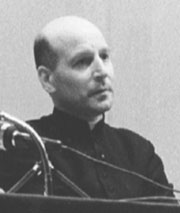 The fight could resume. In February 1969, he began a national Crusade against the New French Catechism, and before full house audiences in Paris and in provincial France, winning the traditionalists over unanimously to his opinion. The faithful had not always understood the discussion pertaining to religious freedom, but the catechism issue affected children and collided with their parents’ concern. So the French bishops became alarmed and intervened for Rome to do something to put an end to this. But what could be done? Condemn Fr. de Nantes? They still had to explain why!
The fight could resume. In February 1969, he began a national Crusade against the New French Catechism, and before full house audiences in Paris and in provincial France, winning the traditionalists over unanimously to his opinion. The faithful had not always understood the discussion pertaining to religious freedom, but the catechism issue affected children and collided with their parents’ concern. So the French bishops became alarmed and intervened for Rome to do something to put an end to this. But what could be done? Condemn Fr. de Nantes? They still had to explain why!
In May 1969, he was summoned to the bishopric of Troyes by Joseph Cardinal Lefebvre. He went there with Brother Gérard. In the presence of Msgr. Fauchet, the Bishop of Troyes, and his chancellor, the cardinal enjoined Fr. de Nantes to sign the formula of retraction and unconditional submission to the Pope and the bishops that he had refused to sign the previous year in Rome. Before answering, our Father asked the cardinal if he condemned the heresy of theNew French Catechism, as well as the Pastoral Note of the Episcopate Regarding Contraception, which took a view opposite to that of the encyclical Humanæ Vitæ.
The cardinal answered with a vehement defence of the texts in question. Accordingly, Fr. de Nantes objected to his being his judge, and refused to carry on with the conversation and to discuss anything else.
The decision was then put once again into the hands of the Sovereign Pontiff. On the following July 11, Fr. de Nantes received an ultimatum from Cardinal Seper, Cardinal Ottaviani’s successor, ordering him to retract his accusations of heresy, schism and scandal.
His answer was crystal-clear:
« I cannot in conscience retract the grave accusations made, in full lucidity and prudence, against the reigning Pope and the Second Vatican Council on account of their so-called pastoral and reforming acts. This is because these acts appear to me, after careful study, to be contrary to the Catholic faith and because they are manifestly in our experience the cause of the general disorder and present ruin of the Church. No solid arguments have been opposed to my analyses and demonstrations. To regard them a priori and without further examination or evidence as rash imputations is a facile way of proceeding, both disagreeable and unconvincing.
« I cannot in conscience repudiate the charge of heresy which I have formulated on several specific and public occasions against Pope Paul VI, nor, therefore, can I take back the conclusion which I drew from it, concerning the advisability of his deposition by the clergy of Rome should he persist in this heresy after due warning, because no serious argument has been opposed to me either with respect to the fact of heresy or to the steps which should be taken in such a case. I shall withdraw my accusations and make due amends if the strange ideas and expressed aims of the reigning Pope can be proved to me to be truthful and honest and in keeping with the sacred deposit of the Faith, something which no one has ventured to attempt. Or if they were one day to form the subject of infallible definitions by the solemn Magisterium, something which is clearly impossible! » (...)
So, each side had put its case. Some people were going to draw false conclusions, and a new battle began on a new front.
AGAINST DISSIDENCE
While our Father was yet feeling the impact of Cardinal Seper’s ultimatum, on July 21, 1969 some integrist priests, whose names are completely forgotten today, met at Maison Saint-Joseph in order to try to convince him that the Pope was deposed on account of the promulgation of a new Ordo Missae due to come into force in the autumn. The temptation to dodge the wrath of Rome by following these “ sedevacantist” schismatics in their act of dissidence did not even cross the mind of the theologian of the Catholic Counter-Reformation. He had given his reply in advance in the Profession of Faith sent to Cardinal Seper on July 16, while justifying his refusal to sign the retraction demanded:
« The formula that has been imposed on me forbids me – in violation of Catholic teaching – to entertain the possibility, even a theoretical one, that the Pope, either as a public or private person, may fall into heresy. Moreover, it describes as perverse the normal, necessary and prudent conclusion taught by the best theologians of the Church: Papa haereticus deponendus est, a heretical Pope should be deposed. It also assumes, against all truth and justice, that opposition to the Pope on the grounds of heresy is in itself sacrilegious and unlawful, even though it is recognised by the Church as legitimate and in certain cases mandatory. »
When our Father learned the following month – through the press ! – that the Sacred Congregation for the Doctrine of the Faith had declared « disqualified » « the totality of his writings and his activities by which he claims to serve the Church », this « notification » devoid of canonical significance showed the ecclesiastical authorities’ inability to refute the very content of his accusations through the authority of Holy Scripture and the teachings of the infallible Magisterium.
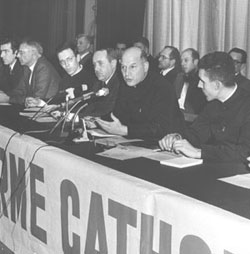 By refusing to the same extent an unconditional submission to the Pope and an act of dissidence, considering both as abusive and profoundly immoral, Fr. de Nantes entered onto a « crest line », in between two abysses. To the left lay the abyss of heresy into which the conciliar Church had sunk, and to the right, that of schism into which the “integrists” were plunging.
By refusing to the same extent an unconditional submission to the Pope and an act of dissidence, considering both as abusive and profoundly immoral, Fr. de Nantes entered onto a « crest line », in between two abysses. To the left lay the abyss of heresy into which the conciliar Church had sunk, and to the right, that of schism into which the “integrists” were plunging.
Only a small number agreed to follow him along this narrow way. For the big traditionalist movement that had assembled against the New Catechism had split over the issue of the New Mass: the integrists held it to be invalid and concluded that there was no longer a Pope. Our Father tried to show them that even if the Pope has fallen from office from the very fact of having promulgated a heretical and invalid Mass, it was still necessary that the whole Church should recognise and acknowledge this “deposition” through a judgement of the competent authority in Rome. (...) His interlocutors were not only schismatics but also heretics, since they had lost faith in the Church and in Our Lord's promises.
Fr. de Nantes then founded the League to keep the “traditionalists” on the narrow Catholic Counter-Reformation « crest line ». « I do not wish to see a Tridentine Mass party claiming to be the true Church, the Church of the good priests, the Church of the just, anymore than I want to see the other party - that of the Reform. A party cannot be the Church »
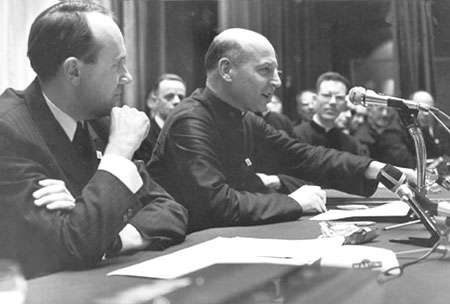
Starting on May 13, 1971, he gave a series of public lectures devoted to the study of the Acts of the Council. He called for « a true and great Third Vatican Council that will enthusiastically rid us of the putrefied corpse of Vatican II. » The word « corpse » is once again an extraordinary premonition of the Third Secret. (...)
While some want to reform the Church, which is a sacrilege, for the Church is holy ! Others claim to save it, when it is the Church that will save us ! Our Father, Fr. de Nantes, leads those who follow him between these two pitfalls, teaching them this prayer :
« Jesus, far be it from me to judge the Church, my Mother or to ever separate myself from her, far be it from me ! I have too great a need for the nourishment that she provides me to distance myself from her for a single day, I have too many desires that she alone can satisfy to be able to consider her as alien to me. Outside the Church, there is no salvation for me either in Heaven or on earth, and if, as the Apostles long ago rebuffed the noisy children or the importunate blind man, I happened to be driven from her, O my Saviour, I would remain under the porch listening to the fraternal voices singing the divine praises and I would beckon, even then, to passers-by to enter so as to enjoy the goods from which I would be excluded. » (Mystical Pages n° 13, July 1969, Vol. I, p. 79)
Refusing to follow the Popes Paul VI and John Paul II, and the Second Vatican Council, that is to say all the bishops of the world, into heresy, schism and scandal, he did not however consider himself to be better than others :
« If I have not fallen, if I have not been swept away, it is through grace ! Lord and Sovereign Judge of my soul, I am not the accuser of my brothers and fathers, but the heir and the companion of their struggles and of their miseries. Their fight is mine, mine helps theirs. » (ibid.)
This is how, for the defence of the Church and the Faith, he will be impelled to take his complaint to the vicar of Christ, in Rome.
Brother Bruno of Jesus
Taken from He is Risen! n° 20, April 2004